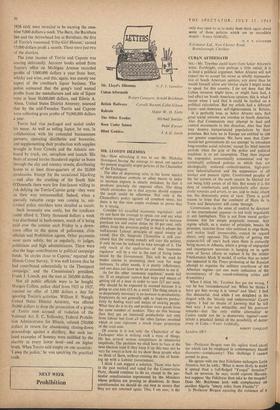CUBAN AFTERMATH
Stn,—Mr. Toynbee could learn from Senor Alvarez's letter. Forthright, even perhaps a little unfair, it is at least a political argument. Senor Alvarez will not expect me to accept his views as wholly representa- tive of South American opinion, any more than he would himself allow any-similar claim I might make to speak for this country. I do not deny that the Cuban invasion might have, or might have had, a bad effect on South American opinion: this is what I meant when I said that it could be faulted on a political calculation. But my article had a different focus—anti-American self-righteousness in Britain.
It is perfectly true, as Seflor Alvarez says, that great social reforms are overdue in South America. Also that Communists may attempt to lead and control movements in this direction. Also that they may deceive inexperienced populations by their promises. But here we in Europe are entitled to cite our greater experience. We have seen that Com- munist-led governments do not attempt `to introduce long-overdue social reforms,' except for brief interim periods when the grip of the police and political machines is as yet incomplete. They then impose the unpopular, economically nonsensical and ter- roristically enforced policies to which they are ideologically enslaved—collectivisation, high-pres- sure industrialisation and the suppression of all worker and peasant rights. Uninformed peoples at the far corners of the earth cannot be blamed for not being fully aware of all this. But surely it is the duty of intellectuals, and particularly after demo- cratic reverses and errors, to see, and to make others see, the democratic point of view. There is good reason to hope that the continent of Haya de la Torre and Betancourt will come through.
Communism—in the sense of control by devotees of the international apparat—is not truly negotiable in any hemisphere. This is not from moral perfec- tionism, but for simple pragmatic reasons. Any regime which, as a matter of principle, breaks its promises, executes those who continue to urge them, and makes itself irremovable, cannot be argued about, only opposed. The difficulty of getting the apparatchik off one's back once there is currently being shown in Albania, where a group of unpopular and incompetent terrorists is hanging on in spite even of Soviet efforts to replace it by the milder Frankenstein Mark II model. (I notice that no letter has appeared in the Times protesting at the Russian attempt to organise the military overthrow of the Albanian regime—yet one more indication of the inconsistency of the round-robinning critics and dramatists.) When I think Mr. Toynbee has got me wrong, I say he has 'misunderstood' me. When he thinks I have got him wrong it is 'smear' and 'libel.' I find this distasteful. And while I am delighted at his disgust with the 'bloody and undemocratic' Castro regime, I had no means of knowing that he felt that way. I am not telepathic, and his previous remarks—that 'the only visible alternative' to Castro could not be 'a democratic regime'—con- stitute a practical denial of the possibility of demo- cracy in Cuba.—Yours faithfully,
ROBERT CONQTJEST
London, SW


















































 Previous page
Previous page